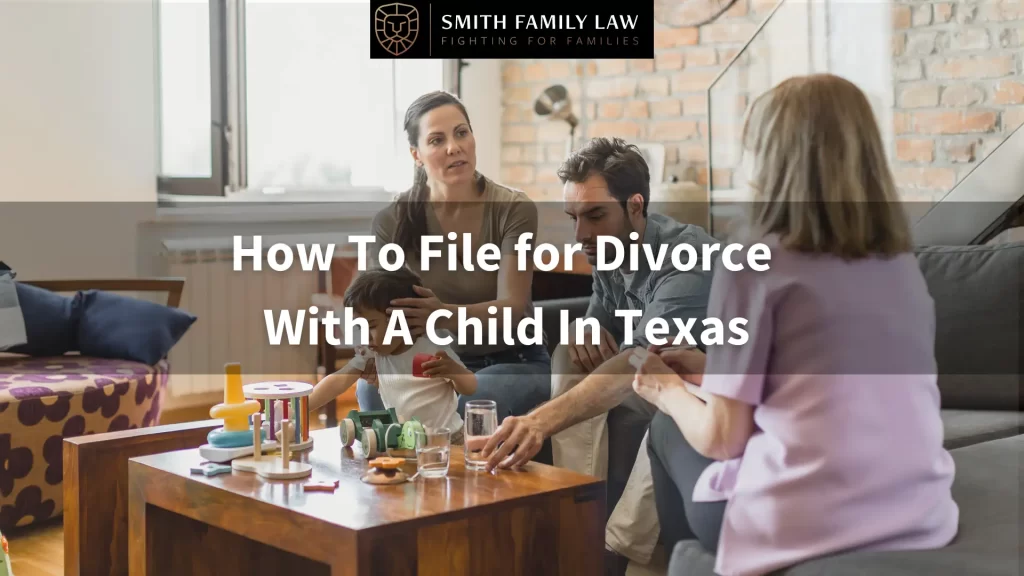Divorce is a messy and emotional matter, and it gets even more complicated when children are involved. The well-being and best interests of the children become paramount, requiring careful attention and consideration throughout the process. Here’s what you need to know about how to file for divorce with a child in Texas.
Filing for Divorce with Children in Texas
Divorce is a significant life event that alters the familial landscape for everyone involved. For couples with children, the impact is amplified. Consequently, divorcing couples with children must keep numerous special considerations in mind, including the following:
- The child’s emotional well-being – Divorce is emotionally challenging for everyone, especially children. It is essential to prioritize their emotional well-being and provide support during this transition. Maintaining open communication, encouraging the expression of feelings, and considering counseling or therapy options can help children cope.
- The child’s education – Education is a significant aspect of a child’s life. Divorcing parents should consider the impact of the divorce on the child’s schooling and make arrangements for their continued education. This includes decisions regarding school selection, teacher communication, and involvement in the child’s educational activities.
- The child’s medical care – Divorcing parents should discuss and determine how medical decisions for the child will be made, including consent for medical treatment, access to medical records, and sharing of healthcare expenses.
- Co-parenting communication – Effective communication between co-parents is vital for the well-being of their children. Establishing a cooperative co-parenting relationship can facilitate decision-making, consistency in parenting styles, and the ability to address any new issues or concerns regarding the children’s welfare.
- Financial support – Providing for a child’s financial needs is essential. Determining child support arrangements per state guidelines or through negotiated agreements is necessary to ensure each child’s financial stability. It’s important to consider factors such as healthcare costs, educational expenses, extracurricular activities, and overall standard of living.
Child Custody Laws in Texas
Unlike many other states, Texas law uses the term “conservatorship” rather than “custody” when discussing parental rights and responsibilities in a divorce. This terminology emphasizes the parents’ roles as “conservators” or caretakers of their children rather than owners.
There are several types of conservatorship in Texas: joint managing conservatorships (JMCs), sole managing conservatorship (SMCs), and possessory conservatorships. Each type has different implications for the division of parental rights and responsibilities.
In a joint managing conservatorship (JMC) arrangement, both parents share parental rights and duties. However, this does not necessarily mean equal physical custody. One parent is usually granted the exclusive right to determine the primary residence of the child, while the other parent is often granted visitation rights according to a schedule determined by the court.
In some cases, the court can also grant sole managing conservatorships (SMC). An SMC gives one parent the exclusive right to make certain decisions about the child’s life, such as where they will live, where they will go to school, and the medical treatment they will receive. This occurs when the court determines that granting joint conservatorship would not be in the child’s best interest.
Possessory conservatorship typically applies to the parent who does not have primary custody of the child (the non-custodial parent). This parent still retains certain rights and duties, including the right to access and possess the child at specified times, the right to receive information about the child’s health and welfare, and the duty to support the child financially.
The guiding principle in all conservatorship decisions is always the child’s best interest, as mandated by the Texas Family Code. The court considers various factors in making conservatorship determinations, including the following:
- The child’s wishes, if they are sufficiently mature
- The child’s current and future emotional and physical needs
- Any existing or potential emotional and physical danger to the child
- The parenting abilities of each individual seeking custody
Texas Divorce Forms
The divorce process involves a significant amount of paperwork, and each form serves its own unique purpose. The process starts with the Original Petition for Divorce. This document signals to the court and to the other spouse that one party wishes to end the marriage. It includes essential information about the marriage, like current living arrangements, children, property, debts, and the reason for divorce.
After filing and serving the petition, the other spouse can choose to file an Answer, a response to the petition. The court will also need information about the couple’s finances, property, proposed child custody arrangements, and more. These are typically outlined in a Financial Affidavit or Statement of Property document.
As the process nears completion and all issues are resolved, the court will issue a Final Decree of Divorce. This document will include all the court’s orders concerning the division of property and debts, child custody, visitation, child support, and spousal support.
Related Posts:
- Can You Get A Divorce While Pregnant In Texas?
- What Can Be Used Against You In A Divorce?
- When Can a Child Decide Which Parent to Live with in Texas?
- Navigating Long Distance Co-Parenting And Custody Arrangements
- Can I Get A Reimbursement For Overpaid Child Support In Texas?
Child Support in Texas Divorce Cases

Texas calculates the non-custodial parent’s child support as a percentage of their net resources, factoring in allowable deductions. The percentage depends on the number of children needing support, each child’s needs, and the ability of the non-custodial parents to pay their support obligations.
Securing an appropriate child support order is critical to ensuring the well-being of your children in divorce. This requires not just a thorough understanding of the law but also the ability to present evidence persuasively regarding your financial resources, your expenses, and your children’s needs. A skilled divorce lawyer can be of great help in this regard.
Contact a Texas Divorce Lawyer Today
Divorce is an emotional roller coaster that comes with significant legal and practical challenges. But remember, you don’t have to go through it alone. The experienced team at Smith & Bledsoe Family Law can guide you through the process of how to file for divorce with a child in Texas. Our team will also advocate for your interests and work towards securing a positive outcome for you and your family.
Contact us today to learn more about how we can assist you in a free case evaluation.
